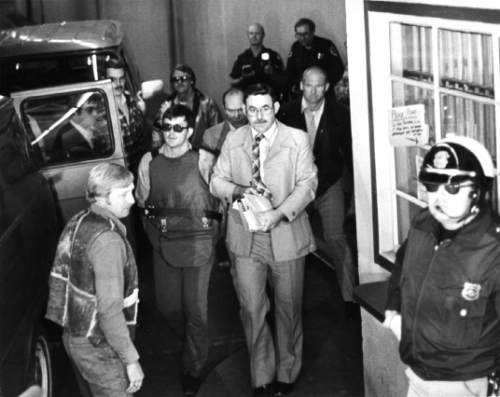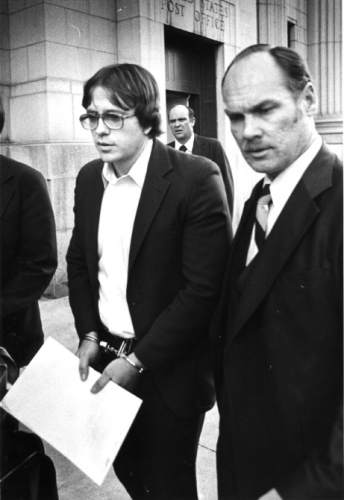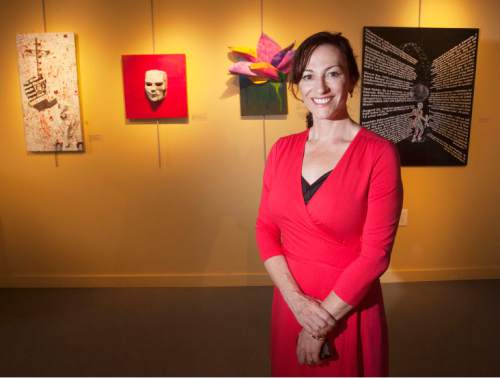This is an archived article that was published on sltrib.com in 2016, and information in the article may be outdated. It is provided only for personal research purposes and may not be reprinted.
More than 35 years after Terry Elrod Mitchell watched serial killer Joseph Paul Franklin fatally shoot two black Salt Lake City joggers, the Utah woman is suing a former federal prosecutor in the case — now a federal judge — who she says sexually assaulted her during the 1981 trial.
In a federal civil lawsuit filed Wednesday, Mitchell alleges Richard Warren Roberts, then a civil rights attorney for the U.S. Department of Justice, raped her repeatedly while in Utah to aid in Franklin's prosecution.
A monthslong investigation by the Utah attorney general's office and a review by former U.S. District Judge Paul Cassell found that Roberts did have a sexual relationship with Mitchell, who was 16 at the time, during the course of the Franklin trial. But the office, Cassell and a third judge, Raymond Uno, determined that, based on the laws on the books in 1981, the office could charge Roberts only with a class B misdemeanor, punishable by six months in jail.
Under current law, Roberts' conduct, which he admitted to in a phone call Mitchell recorded in 2014, would warrant a felony charge, according to Cassell's 25-page summary of several hundred pages of evidence gathered during the course of the investigation. The report was released by the A.G.'s office Wednesday, subsequent to the filing of the lawsuit.
Spencer Austin, chief criminal deputy to the attorney general, said after receiving the report in August, his office notified the Justice Department, two congressional committees, the office of the courts, the bar association and law enforcement agencies that handled the Franklin case — the Salt Lake County district attorney's office and the U.S. attorney's office.
Roberts is now on the federal bench and the chief judge of the U.S. District Court for the District of Columbia.
"We have conclusive proof. This isn't just a 'he said, she said,' " Mitchell's attorney, former Salt Lake City Mayor Rocky Anderson, said Wednesday, although he declined to share specifics. "It's proof we will offer at trial."
According to The National Law Journal, Roberts filed retirement papers Wednesday.
Court papers say Roberts, then 27, coerced Mitchell's silence by telling the then-16-year-old girl that if the alleged assaults were discovered, a mistrial would be declared and Franklin would go free.
In a statement provided to The Tribune, an attorney for Roberts acknowledged that the judge and Mitchell had sex, but he claims it was consensual.
"Roberts acknowledges that the relationship was indeed a bad lapse in judgment," the statement from Washington, D.C.-based attorney Jason Weinstein said. "However, the relationship did not occur until after the trial and had no bearing on the outcome of that trial."
The statement also claims that Roberts has always held "respect and admiration" for Mitchell and said their contact in the years since the Franklin case had been "warm, caring and friendly, which makes these new, false allegations all the more puzzling and disappointing."
The statement characterizes Roberts, who was appointed to the federal bench by President Bill Clinton in July 1998, as a person of honor and integrity.
"He intends to vigorously challenge these false allegations in court," Weinstein said.
Meanwhile, Rep. Jason Chaffetz, chairman of the House Oversight and Government Reform Committee, said in a statement Wednesday, "Our initial review of the allegations [against Roberts] has caused alarm and distress over their serious nature."
Chaffetz said that the Utah attorney general recently made his committee aware of "credible evidence of misconduct" by the judge.
"We will work with the House and Senate judiciary committees," Chaffetz added, "to determine next best steps to ensure justice is served."
Mitchell, who was injured by shrapnel in the Liberty Park shooting of her friends, was emotionally battered and fragile at the time of the alleged sexual abuse, according to the complaint filed Wednesday in Salt Lake City's U.S. District Court.
The alleged assaults so further traumatized Mitchell that she suppressed her memories of the events. But the memories surfaced in 2013, court papers say, when Roberts emailed Mitchell, now a 51-year-old real estate agent, hours after Franklin was executed in Missouri.
"This event triggered the beginning of the release of Mitchell's memories about her abuse by defendant Roberts," court papers say, even though she had been in counseling since the 1980s.
The lawsuit asserts multiple emotional and physical injuries, including assault, battery, intentional and negligent infliction of emotional distress, and sexual abuse of child. It seeks a jury trial and damages of up to $25 million.
The lawsuit can be brought in 2016 — 35 years after Franklin's trial — because Roberts left Utah and never returned, so any deadline for raising the allegations was put on hold, according to the lawsuit.
Other reasons that the suit can be filed now include the fact that severe trauma had impeded Mitchell's memory for many years and the recent passage of Utah legislation that expands the window for filing criminal charges related to child sexual abuse to within 35 years of a victim's 18th birthday, or three years from the effective date of the law, whichever is later, Anderson said. The law also sets no limit on when a civil action can be filed for child sexual abuse, he added.
"A prosecutor has the duty to avoid any actual, or even the appearance of, personal bias," Anderson wrote in the complaint. "Perhaps the most outrageous violation of that duty would be to have sex with a major eyewitness of the case, particularly a young girl who was as vulnerable as Mitchell."
Mitchell, then known as Terry Elrod, was 15 at the time of the Liberty Park shooting on Aug. 20, 1980, and had already been the victim of a violent crime.
The murders left the white teenager "emotionally and physically isolated," court papers say, shunned and harassed by family, friends and schoolmates, who disapproved of her friendship with the two black men. Media accounts of the murders also made false claims about Mitchell and her father, who was president of a motorcycle club based near Liberty Park and who was initially tied to the shooting.
Mitchell's father eventually left Utah to avoid the publicity; her mother suffered repeated harassment at work; her sister, then a second-grader, was severely beaten.
"This event debilitated and terrified Mitchell, and she blamed herself for its occurrence," court papers say.
Two months before the shooting, Mitchell had been brutally raped by another man near the Salt Lake City International Airport. The case went public after the park shooting, with some Utah media outlets suggesting that the accused — Phillip George Moore — was responsible for the fatal park shootings. Moore eventually pleaded guilty in the rape case, court papers say, and Mitchell left Utah to live with family in Arizona.
When she returned, Mitchell met Roberts, who had been sent from Washington, D.C., by the Justice Department to aid prosecutors with the Franklin case.
Court papers say the two met frequently in January and February 1981 as Mitchell prepared to testify during the trial.
Roberts had "knowledge of and assessed Mitchell's vulnerabilities and exploited them in interacting with her and gaining her trust," Anderson contends in the court filing.
Then, the lawsuit states, Roberts "used his authority, his education, his sophistication and his affluence to make it appear to Mitchell, Mitchell's mother, personnel in the U.S. attorney's office and others that he was safe and to be trusted with Mitchell."
According to the lawsuit, shortly before the trial, Roberts invited Mitchell to dinner after completing an interview at the federal courthouse, but instead took her to his hotel and forced her into sex — despite her objections.
The assaults continued, court papers say, throughout Roberts' stay in Salt Lake City, and he "sought to characterize the continued sexual abuse of Mitchell as an 'affair,' " even telling Mitchell that he might call off his pending engagement so he could be with the teen.
The court documents say that Roberts would sometimes watch himself being interviewed about the trial on television at the same time he was having sex with Mitchell.
"It was all very creepy and disturbing to Mitchell," court papers says.
Roberts also often took pictures of Mitchell during the encounters, court papers say. On his last day in Utah, he photographed her both clothed and naked, leaving with her the pictures of herself in her clothes.
Roberts continued to call Mitchell after leaving Utah, court papers allege, reminding her to keep quiet.
Based on assertions by Roberts that Mitchell would be blamed if Franklin were set free, she complied, court papers say.
"Mitchell felt immense guilt for surviving the attack that killed her friends," the lawsuit states. "She blamed herself … was terrified by Franklin and did not want anyone else to die or suffer."
Emotionally damaged and wrestling with guilt for surviving the shooting, Mitchell dropped out of high school and has continually struggled physically and emotionally throughout her life, court papers say. Those challenges include muscle spasms, cluster migraines, suicidal thoughts, night terrors, sleep walking, difficulties with comprehension, anxiety, anorexia, post-traumatic stress and other detrimental impacts on her relationships with others, according to the lawsuit.
In June 2014, Mitchell recorded a phone conversation with Roberts in which he acknowledged their sexual relationship, although they disagreed on whether it occurred during her testimony in the Franklin trial or after she had testified.
Mitchell's former attorney, Ron Yengich, notified the attorney general's office shortly after the call was recorded, and two investigators with the office spent more than a year delving into the allegations.
Austin said Wednesday that the office hired Cassell to review the findings because, as a former federal judge and an advocate for victims' rights, the office believed he could appreciate the full scope of the alleged misconduct.
"Under Utah laws as they existed in 1981, she was old enough to be able to consent to the sexual relations," Cassell wrote in his summary of the findings. "And while Ms. Jackson-Mitchell has alleged some coercion to force her to participate in these sexual relations on the first occasion, it does not appear that these allegations are strong enough to support a criminal prosecution."
Cassell said in a "real world" sense, while the first encounter may fit the statutory definition of rape, the case would be almost impossible to prosecute.
But Roberts' repeated encounters with the minor who was a witness in the trial "very likely" constituted violations of multiple ethical standards of the courts, the bar and the Justice Department.
Not only did Roberts have a duty to disclose the relationship, but he also should have disclosed it to Franklin's defense attorneys — information that could have been used to impeach Mitchell's testimony.
"At a minimum, the [Salt Lake County district attorney's] office may have a duty to investigate and make a determination whether this impeachment evidence would have 'undermined confidence in the verdict or sentence' against Mr. Franklin," Cassell wrote, "although it seems obvious that the information did not materially alter the strength of the state's case."
Anderson said he was "absolutely astonished and appalled" at the way the attorney general's office handled the investigation. He said he suspects Chaffetz leaked the report.
"All they've done is help undermine the case," he said. "This victim feels further victimized by those who are supposed to be representing the interest of the victim."
Three years ago, Mitchell told The Salt Lake Tribune she had become an artist who had all but conquered the nightmare of the shooting.
Twitter: @jenniferdobner
@robertgehrke















